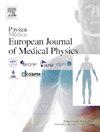预测机器人颅内 SRS/SRT 计划质量的多中心方法。
IF 3.3
3区 医学
Q1 RADIOLOGY, NUCLEAR MEDICINE & MEDICAL IMAGING
Physica Medica-European Journal of Medical Physics
Pub Date : 2025-01-01
DOI:10.1016/j.ejmp.2024.104887
引用次数: 0
摘要
目的:分析射波刀(CK)脑SRS/SRT计划的机构间一致性和剂量梯度变异性。研究了多中心预测模型的可行性,以指导/自动化规划优化。方法:8个CK中心收集了335份临床计划的数据,这些计划分为1-5个部分,用于单个病变。计算符合指数(CI)、剂量梯度指数(DGI)和不同等剂量体积定义的有效半径(Reff)。从PTV维度分析了剂量衰减的可预测性。DGI平均值、80和10百分位值按PTV大小分为6组。建立了以PTV等效半径为函数的Reff线性回归模型。结果:88/335个计划的CI值(范围0.96—2.23)超过1.20,大部分(65 %)收集于2个参与中心。DGI表现出可接受的机构间变异性和强显著相关性(p ),Reff与PTV半径的回归值为 ≥ 0.958,表明随着等剂量值的减少,中心间变异性增加。结论:观察到的中心间差异增强了多研究所方法的优势。CK脑SR/SRT计划中剂量衰减的多中心预测模型是可行且易于使用的。Reff模型和DGI分析可能允许部分自动化规划优化,避免创建次优计划。本文章由计算机程序翻译,如有差异,请以英文原文为准。
Multicenter approach to predict plan quality of robotic intracranial SRS/SRT
Purpose
This study analyzed inter-institute conformity and dose gradient variability of CyberKnife (CK) brain SRS/SRT plans. The feasibility of multi-center predictive models was investigated, aiming at guided/automated planning optimization.
Methods
Data from 335 clinical plans, delivered for single lesions in 1–5 fractions, were collected by 8 CK centers. Conformity index (CI), Dose Gradient Index (DGI) and the effective radii defined by different isodose volumes (Reff) were computed. Predictability of dose fall-off from PTV dimensions was analyzed. DGI average, 80th and 10thpercentile values were evaluated stratifying plans by PTV size into six groups. Linear regression models were created for Reff as a function of PTV equivalent radius.
Results
CI values (range 0.96–––2.23) exceeded 1.20 in 88/335 plans, mostly (65 %) collected in 2 of the participating centers. DGI showed an acceptable inter-institute variability and a strong significant correlation (p < 0.0001) with PTV. Ideal and Minimal DGI for each of the six groups were respectively 95 (86), 82 (73), 77 (68), 71 (60), 59 (43) and 50 (29). The rate of DGI values passing the multicenter minimal criteria, considering each center separately, varied from 43 % to 100 %. R2 values for the regression between Reff and PTV radius were ≥ 0.958, showing an increasing inter-center variability for decreasing isodose values.
Conclusion
Observed inter-center differences enhanced the advantages of a multi-institute approach. Multicenter predictive models for dose fall-off in CK brain SR/SRT planning are feasible and easy to use. Reff models and DGI analysis may permit to partially automate planning optimization avoiding creation of suboptimal plans.
求助全文
通过发布文献求助,成功后即可免费获取论文全文。
去求助
来源期刊
CiteScore
6.80
自引率
14.70%
发文量
493
审稿时长
78 days
期刊介绍:
Physica Medica, European Journal of Medical Physics, publishing with Elsevier from 2007, provides an international forum for research and reviews on the following main topics:
Medical Imaging
Radiation Therapy
Radiation Protection
Measuring Systems and Signal Processing
Education and training in Medical Physics
Professional issues in Medical Physics.

 求助内容:
求助内容: 应助结果提醒方式:
应助结果提醒方式:


